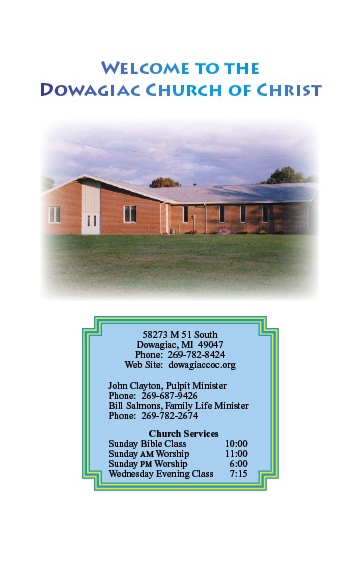Home Worship Services Sermons and Classes Location Contacts Bulletins Links |
FAMILY NEWSCLASSES — WE NEED YOUR INPUT: As we head into fall, we also are nearing the end of several classes that we have had going for quite a while. Richard Hoyt has been leading us in a study of the Minor Prophets of the Old Testament. We have finished Amos, and the other prophetic books are short, so before long we will finish that study. John Clayton has been leading a study of the Holy Spirit and that study will end soon as well. We want to have classes that people are interested in or feel a need for. Richard and John have made up a sheet of ideas of classes that might be of interest. That sheet is enclosed in your bulletin. You may want a class we did not think of that should be added to the list. Please take a few minutes and indicate what class you would be interested in. We would hope that some who have not developed a habit of attending Bible classes would seize upon this opportunity to change that habit by picking a course of study, and it may be that some who have not been willing to teach will accept the responsibility to study and teach one of these options. Give us your input! TODAY'S LESSON
INTRODUCTION
A. Why do we cry — have tears?
I. STRONG MEN CRY — 2 Samuel 18:16 – 19:10
B. Physical benefits — for eyes, for us psychologically C. There is a deeper purpose. 1. Only humans have aesthetic tears.
D. We need to think about our spiritual pollution issues.
2. Comes from emotions — unexplained. 1. Can be both — as in childbirth — or a song
2. Women weep more than men — Why? Live longer. A. David — Absalom
II. IT TAKES STRENGTH TO CARE ABOUT SIN
B. Not of weakness but of honor and respect C. Strong men are capable of love and can show it. A. Luke 13:34 and 19:41 – 44
III. DO YOU CARE ABOUT PEOPLE'S PAIN?
What does it take to make you emotional?
B. Do you really care about Dowagiac, the U.S.?A. In personal loss — John 11:32 – 38
IV. CAN YOU WEEP OVER YOUR SIN?
Notice the amazement of the Jews (verse 36).
B. What do you do in cases of death, illness?
Weakness separates us from the real world
A. Luke 7:36 – 50 — are you that strong?
B. Verse 39 — Is the Pharisee's response yours? 1. What is my attitude about people deep in sin?
C. Verse 47 — Are you capable of love?
2. What is my attitude about my own sin? 3. Does your sin really bring pain to you? 1. Acts 2:37 — Can you be pricked in your heart?
2. What did they do next? THE BACK PAGEQUESTION ABOUT “ABBA FATHER”Several years ago Dave Pickens made a nice box for us to put in the lobby to allow people to ask questions anonymously of a biblical or spiritual nature that we would then answer either during a sermon or in this bulletin. It seems like the only time we get questions in the box is when we have visitors, and this one may be a visitor question, but it is a good one we all need to understand. The question is, “What does the Bible mean when it uses an Aramaic term in reference to God?” The phrase “Abba, Father” is used three times in the Bible. Jesus used it in Mark 14:36 when he prayed to God to “Take this cup from me.” Romans 8:15 uses it in speaking of our adoption to sonship with God, and the Spirit uses it in Galatians 4:6 in reference to God sending the Spirit into our hearts. This phrase is Aramaic, and it is one of only a few cases where Aramaic is brought directly into the New Testament. The bringing of an Aramaic phrase was done only when the meaning was so sacred or special that no Hebrew or Greek word did it justice. The emphasis of “Abba, Father” is that the God of the Bible is a Father (Matthew 6:9), and not a distant, aloof, out of touch deity. The God of the Bible is a loving head of a spiritual family. God does not want us to think of him as the Greeks thought of Zeus — a God of human emotions and weaknesses. That is a struggle many have today. They make God a human and assume that God has the same limitations that humans have. The uniqueness of Elohim is, that in spite of his enormous power, wisdom, and strength, he is also a God of love, compassion, and tenderness. That concept is radical, and for many it it is hard to grasp. In English we have words for father that convey the love and compassion that we desire in our earthly fathers. “Daddy” and “Papa” convey a different meaning than “Sir” and “Father.” God wants us to think of him not as a ruling dictator, but as a loving and caring father who wants us all to be saved eternally (2 Peter 3:9). — John Clayton Our sign by the street!
Sign saying from www.sayingsforchurchsigns.com |

